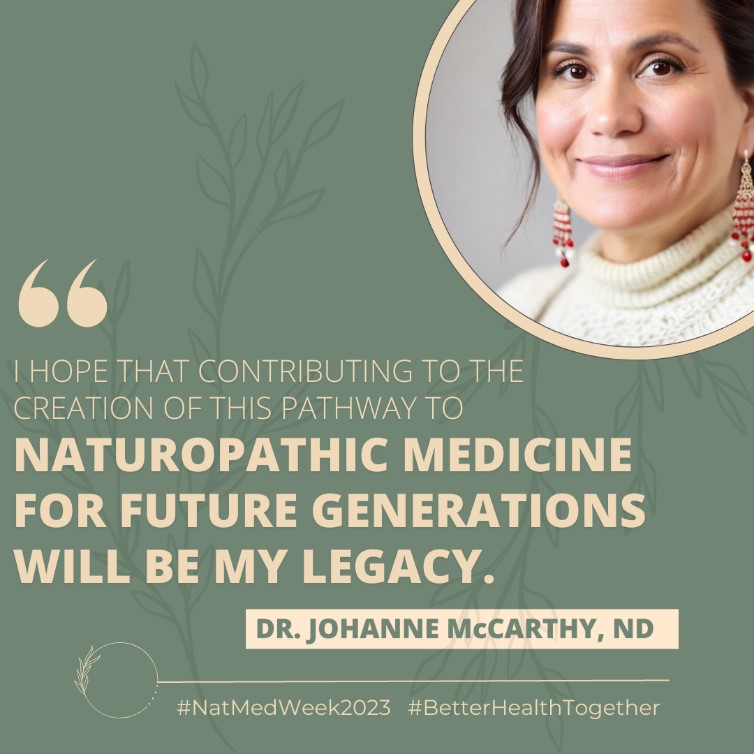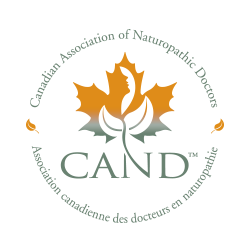12 May Building a Holistically Inclusive and Culturally Safe Pathway to Education
By Dr. Johanne McCarthy, ND
As a young Indigenous woman with a deep love and revere for nature, and an intuitive connection to people, plants and animals, I always felt slightly uncomfortable in the regimented and ordered setting of a classroom. When I was in high school a counselor told me that Indigenous women don’t do well in university and even though I was excelling in school, he recommended I go to college. Sadly, at that impressionable age, I believed him and enrolled in a radiology program in college. While I enjoyed it, there were incredible cutbacks in hospitals during the time I was graduating, which made it difficult to find a job. I was upset and went to a traditional healer who advised me to “be like water and if a boulder gets thrown in your flow, just flow around.” I’ve lived by that medicine ever since.
My flow and love for nature and learning took me to Mc Master University where I enrolled in a medical anthropology program. During this time, a family friend brought me a brochure for The Canadian College of Naturopathic Medicine (CCNM), a school I was unaware of until that moment. Its teachings of botanical medicine and holistic care were a perfect fit for me, and I knew immediately that I had to go, but I couldn’t afford it. I brought this problem to the Director of Indigenous Studies at McMaster who helped to establish a scholarship at CCNM for Indigenous students. The scholarship was established on the premise that a lot of what was being taught was Indigenous knowledge, and that our cultural knowledge had been commoditized and colonized, oppressing access to the original peoples who shared their knowledge in good faith and were unable to pass down our traditions because of the active attempts at cultural genocide in the Residential School system. Thanks to our efforts, the scholarship was established and I became the first recipient.
Master University where I enrolled in a medical anthropology program. During this time, a family friend brought me a brochure for The Canadian College of Naturopathic Medicine (CCNM), a school I was unaware of until that moment. Its teachings of botanical medicine and holistic care were a perfect fit for me, and I knew immediately that I had to go, but I couldn’t afford it. I brought this problem to the Director of Indigenous Studies at McMaster who helped to establish a scholarship at CCNM for Indigenous students. The scholarship was established on the premise that a lot of what was being taught was Indigenous knowledge, and that our cultural knowledge had been commoditized and colonized, oppressing access to the original peoples who shared their knowledge in good faith and were unable to pass down our traditions because of the active attempts at cultural genocide in the Residential School system. Thanks to our efforts, the scholarship was established and I became the first recipient.
I felt a sense of belonging at CCNM and the philosophy of naturopathic medicine felt real and reflective of life. After I graduated, I opened a practice in 2005 after co-submitting a grant for my community to develop a family health team model in collaboration with Indigenous medical doctors (MDs) and Traditional Healers. It was supposed to be MDs, naturopathic doctors (NDs) and Traditional Healers working together, but the funding was refused for NDs, so the model only included MD’s and Traditional Healers.
True to the medicine I’d been given, I didn’t let it stop my flow and I opened a practice in the neighboring town of Caledonia, where I began seeing a lot of students, most of whom were from my community. They were coming to me with stress and anxiety about being in post-secondary systems of education. It was clear that their struggle was not within them and that the lack of diversity and perspective was stifling their health as they were expected to assimilate to systems of education that didn’t represent their whole being, gifts, or diverse identities. With that realization I applied for an opening at the local college as an Indigenous student counsellor. Once I was in that environment, I could clearly see that something needed to change. I began to see the pathology not within the individual, but within the system of education.
With every frustration I felt, a new path and opportunity to make a difference opened. I achieved my master’s degree in organizational leadership and focused on restoring balance and health to organizations following naturopathic principles and philosophy. I shifted from counselor to faculty to curriculum design to program design to consultant of Indigenous education and then finally to my current position at Six Nations Polytechnic (SNP) as the Director of Academic Programs.
My transition to an Indigenous Institute was healing and reinforced my hope that healthy educational environments were a possibility and could greatly benefit the health of the people who work and learn there. SNP offers decolonized systems of education and supports lifelong learning through experiential and participatory learning that fulfills a community need or purpose. Like how I felt at CCNM, the philosophy, education and student support feel holistically inclusive. Language and cultural revitalization are a priority, and our cultural values are embedded in every program offered. We offer a diverse range of programs from community services to health services programming that embeds Indigenous health and healing philosophy and practice into pre-health, personal support worker and practical nursing programs. We are also in the process of developing many other exciting programs, including a culturally safe paramedic program and a holistic health studies college diploma.
I hope that contributing to the creation of this pathway to naturopathic medicine – by removing boulders for future generations and creating opportunities that I never had, but always wished I did – will be my legacy.
